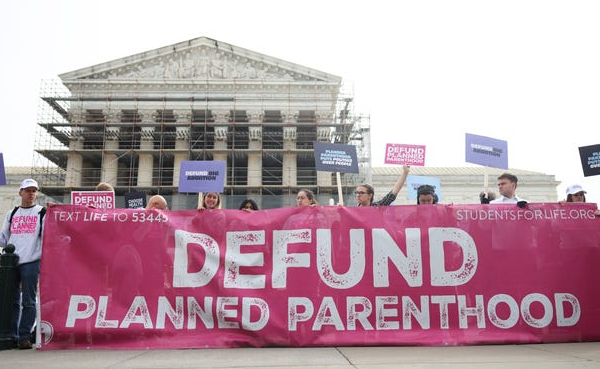In a 6-3 ruling, the U.S. Supreme Court ruled in Medina v. Planned Parenthood South Atlantic that South Carolina may exclude Planned Parenthood’s abortion facilities from its Medicaid program.
The decision, authored by Justice Neil Gorsuch, decided that the federal Medicaid Act does not confer a right to choose any qualified medical provider and that South Carolina has the authority as a state to remove Planned Parenthood from its status as a qualified provider.
Click Like if you are pro-life to like the LifeNews Facebook page!
The main question in the case was whether individual Medicaid beneficiaries may sue state officials for denying patients coverage for their preferred medical provider under Medicaid’s qualified-provider provision. The case involved the Civil Rights Act of 1871 (§1983), which allows individuals to sue government officials for violating federal rights. However, the majority ruled that the Medicaid Act “does not clearly and unambiguously confer individual rights” to choose a provider the state has deemed unqualified. The decision determined that states retain authority over defining medical provider qualifications. The decision reverses the Fourth Circuit Court of Appeals ruling that blocked South Carolina from defunding Planned Parenthood.
The case arose when the pro-life state of South Carolina disqualified Planned Parenthood from the state’s Medicaid funds to avoid subsidizing the abortion industry. Planned Parenthood South Atlantic and one of its Medicaid clients challenged Governor Henry McMaster’s 2018 executive order claiming the exclusion of Planned Parenthood violated “rights” under the Medicaid Act’s “any qualified provider” language. The law’s “any qualified provider” language grants beneficiaries the ability to choose their provider from a pool of providers the state has deemed qualified.
“But federal statutes do not automatically confer §1983-enforceable ‘rights,’” wrote Justice Gorsuch. “This is especially true of spending-power statutes like Medicaid, where ‘the typical remedy’ for violations is federal funding termination, not private suits.”
To prove a federal law creates a right, a statute must pass a “stringent and demanding test” by “clearly and unambiguously” using “rights-creating terms” that unmistakably focuses on individuals, wrote Justice Gorsuch. Unless Congress “speaks with a clear voice, and manifests an unambiguous intent to confer individual rights,” individual plaintiffs like Planned Parenthood or their patients cannot use spending-power laws to sue the state, reads the opinion.
“[The Medicaid Act] lacks the required clear rights-creating language,” wrote Justice Gorsuch.
Justice Gorsuch explained that federal rights-creating laws are “atypical” and cited the Federal Nursing Home Reform Act (FNHRA) as the only “reliable” precedent where a federal statute created a right. The FNHRA gives nursing-home residents “the right to choose a personal attending physician,” among other rights. But he noted the “any qualified provider” provision “looks nothing” like the FNHRA.
Justice Gorsuch further noted that “Congress knows how to create clear rights” and that the Medicaid Act’s exceptions confirm it. The exceptions allow states to exclude medical providers “convicted of a felony” and to “determine” which convictions qualify.
“This makes sense if the provision addresses state duties to the federal government, but creates problems if it also confers individual rights—Congress would grant rights in one breath while letting States control their scope in the next,” wrote Justice Gorsuch.
Justice Clarence Thomas wrote a concurring opinion to provide clarity regarding spending clauses and enforceable rights. He wrote that “spending power cannot ‘secure’ rights” because conditional spending legislation amounts to a contract and is dependent on the states freely accepting the terms. Since Justice Gorsuch noted that federal funding can be terminated for not meeting the spending conditions, Justice Thomas stated that the Medicaid Act cannot “guarantee” the states will accept Congress’ conditions.
When a state receives federal funding, wrote Justice Thomas, mandatory obligations imposed by Congress “would contradict the bedrock constitutional prohibition against federal commandeering of the States.” That prohibition, he stressed, “protects state sovereignty” and prevents Congress from drafting “state governments as its agents.”
Justices Elena Kagan, Sonia Sotomayor, and Ketanji Brown Jackson dissented from the ruling.
Liberty Counsel filed an amicus brief in the case noting the law’s language allows for states to disqualify providers that engage in unethical and illegal practices, in which Planned Parenthood has been credibly implicated in these types of practices. According to Liberty Counsel’s amicus brief, Planned Parenthood is implicated in unethical and illegal profiteering of aborted baby body parts revealed through undercover videos by undercover journalists Sandra Merritt and David Daleiden. This “shadowy proliferation” of fetal tissue trafficking gives states like South Carolina a compelling interest to deem the abortion giant unqualified and keep Medicaid funds from subsidizing these “abhorrent” practices.
Liberty Counsel Founder and Chairman Mat Staver said, “Just like there is no federal ‘right’ to an abortion, there is no federal ‘right’ to fund Planned Parenthood for abortions. Now that South Carolina can defund Planned Parenthood’s abortion facilities, all states should follow suit. Taxpayer dollars should never be used to fund abortion or subsidize practices that kill children and harm women.”
The post Supreme Court Confirms Planned Parenthood Has No “Right” to Taxpayer Funding appeared first on LifeNews.com.
Click this link for the original source of this article.
Author: Liberty Counsel
This content is courtesy of, and owned and copyrighted by, https://www.lifenews.com and its author. This content is made available by use of the public RSS feed offered by the host site and is used for educational purposes only. If you are the author or represent the host site and would like this content removed now and in the future, please contact USSANews.com using the email address in the Contact page found in the website menu.








